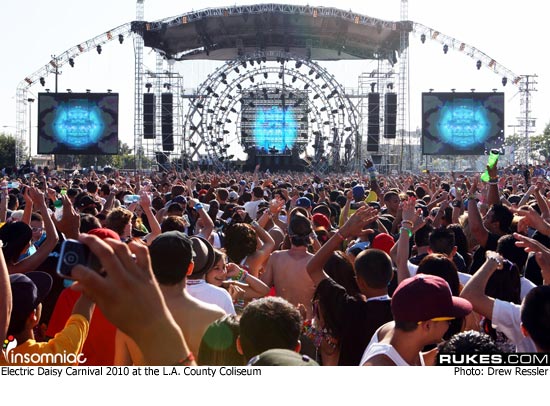The beat goes on—but with new rules
July 21, 2010
The Los Angeles Coliseum Commission on Friday sent a strong signal that it would like to remain in the rave business but only if promoters of the massive electronic dance events can control them more tightly to avert tragedies like last month’s apparent drug death of a 15-year-old girl.
The commission, which oversees the Los Angeles Memorial Coliseum and Sports Arena, approved 11 recommendations aimed at better protecting the health and safety of concertgoers during three upcoming festivals, or raves, scheduled for the Sports Arena between August and New Year’s Eve. On the advice of its lawyers, the commission is allowing those events to move forward because of contractual obligations.
The commissioners also voted to continue a moratorium on signing any new contracts with festival promoters until it can be determined whether the more restrictive rules—including an enforced age limit of 18—substantially reduce the kind of problems that marred last month’s Electric Daisy Carnival at the Coliseum.
The two-day event drew 185,000 people and ended with dozens of attendees being transported to area hospitals, many for overdoses related to the drug Ecstasy, apparently including teen Sasha Rodriguez, who later died.
Among the many speakers who appeared before commission on Friday was a representative of Rodriguez’s parents. In a statement, the couple urged the commission to “put our children’s health and safety ahead of profits.”
Los Angeles County Supervisor Zev Yaroslavsky, a commission member who first called for the moratorium after Rodriguez’s death, said he was unhappy that the panel was legally locked into the upcoming concerts. He also said he’s “very pessimistic that they can be done more safely.”
“But the next best thing is that we have a new set of rules and regulations that we can enforce,” said Yaroslavsky. He then bluntly warned promoters of the upcoming festivals that they’re “on probation”—in control not only of their business futures but of the lives of the young people who attend their events.
The new health and safety rules—endorsed by Electric Daisy Carnival’s promoter, Insomniac, Inc.—were contained in a preliminary report prepared by an outside law firm, Miller Barondess, headed by attorney Skip Miller. On Friday, after an hour-long closed session, he provided highlights of the 14-page report during the commission’s public meeting.
Among other things, Miller’s report provided a historical perspective of the underground roots of raves and their lucrative explosion into the mainstream, now packing major venues across the nation, including the Coliseum and Sports Arena. Since 1998, according to the report, those two venues have hosted 37 electronic music festivals, drawing an audience of more than 1 million people.
With that kind of draw, the festivals have become crucial to the economics of the Coliseum. Miller’s report disclosed, for example, that the historic stadium grosses approximately 28% of its revenue from such events as Electric Daisy Carnival, Monster Massive, Together As One and Love Festival.
What’s more, according to the report, the Coliseum hired more than 4,400 people to provide services in connection with the Electric Daisy Festival. Miller also noted that local businesses have profited as well from the event, which his report contends was exceptionally well planned—an observation supported by Los Angeles police and fire officials during testimony Friday.
LAPD Commander Andrew Smith, who was responsible for the department’s personnel within the Coliseum, said planning for the event was “every bit as thorough as for a Lakers’ parade.”
With so much money on the line, the Coliseum Commission has been placed in a difficult spot, caught between these financial realities and the need to assure the public that safety issues trump all else.
The sensitivity of that task was brought into stark relief during the hearing’s most dramatic moment, when Debbie Macaluso and her 19-year-old daughter, Aisha Marmer, took the microphone for their allotted 60 seconds of testimony.
Macaulso recounted how her daughter had overdosed on Ecstasy during last year’s Electric Daisy Carnival. She ended up on life support for two months and suffered four strokes, the mother said, her voice cracking. “It’s all about money, not the kids,” she said of the raves.
Aisha, who has been forced to undergo extensive speech therapy, said simply of the raves: “I just think it’s not a safe thing.”
Los Angeles City Councilman Bernard Parks, also a member of the Coliseum Commission, said the public should not be mislead into thinking that the new rules, which call for better health precautions and more drug education, are a cure-all for the problems plaguing raves.
“There are no perfect events,” said the former LAPD chief. “I don’t want to overplay what we can do.”
Posted 7/16/10













 405 bridge work causes a stink
405 bridge work causes a stink
